July 22, 2016, by Charlotte Dore
Recipes to try out before you start uni
Thankfully being a slightly less than perfect Mary Berry when it comes to cooking isn’t a bad thing when you go to uni…. as the expectation bar is set low for us (baked beans on toast is seen as an achievement – how rude!) .
Whether you know how to cook or not, cooking on a budget and quickly can often be a challenge as a student. It seems much easier to order a takeaway to save time, especially with lots of deadlines, socialising and part time work……It’s easy to fall in to these habits at uni, and so I’d like to share with you some staple dishes I tend to cook that are wholesome and kind to the bank balance, along with some handy tips.
1. Classic Spag bol for a cold winter’s evening
spaghetti
passatta
a handful of frozen peas (defrosted)
herbs, salt and pepper
cooking oil
minced beef / meat free alternative.
Method
- Bring a pot of water to a boil. Meanwhile, put a small amount of oil in a frying pan / wok and brown off the mince.
- Using a nifty spaghetti measurer (I got the one here at Fresher’s fayre), measure out your spaghetti, place in the pot of water and turn down the heat slightly.
- Once the mince has browned, turn down the heat and add the passatta (I usually use half a carton), peas and season. Leave to simmer on a low heat for 15 – 20 minutes, or when cooked to your liking.
Rosemary can be grown on window – sills and is a great herb to add to spag bol.
2. Frittata / Omelette for a Sunday brunch
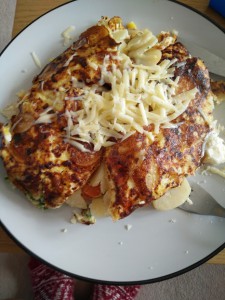
Ingredients
3 eggs
half a tin of new potatoes
a handful of defrosted frozen veg of your choosing
cheese
cooking oil
Method
- Chop up the new potatoes in to thin slices (these are already cooked so should be easy to cut through).
- crack 3 eggs in to a bowl and whisk with the new potatoes and add the veg.
- Heat a small amount of cooking oil in a frying pan and add your mixture from the bowl. Leave to cook on a medium heat, watching for the eggs to cook and flip over to cook the other side. (I flipped mine over in halves because I’m no Jamie Oliver).
- Once the eggs have cooked, serve with cheese.
3. Pasta for those extra busy days
Pasta dishes are awesome because they can be made in bulk and used the next day.
On the left, I have fried off some peppers (originally frozen as I find these to be cheaper) with chicken and then added this to pasta with seasoning.
On the right, I have used left over pasta (always ensure leftovers are cooled and stored in a fridge) cooked in a sauce from the night before and heated it with peas and tinned chickpeas.
It’s worth investing in a large tray to make pasta bakes in.
4. Packed lunches
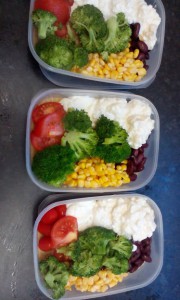
When I’m feeling organised, I try to prepare packed lunches for the week ahead (note, they don’t have to be boring and all the same as here!).
This is what I had for when I was on placement last year. Each contains couscous (although this could be swapped for rice), cottage cheese, kidney beans and veg. This definitely stopped me from being tempted to buy fast food on my break!
For a drink, investing in a water bottle / flask for tea definitely saves money when out and about
Top tips!
- Stock up on kitchen cupboard essentials – spices, herbs, cooking oil, tins.
- Tinned pulses are cheap and an excellent addition to curries, chillies and other dishes.
- It is cheaper to buy in bulk – for instance it took me a year to go through a 4 kg bag of rice! If you can share with housemates, this can work out a lot cheaper in the long run.
- Shopping lists help you spend less, and never shop when hungry (this has resulted in me buying lots of chocolate in the past).
- Look at the bottom and top shelves in supermarkets – these are where cheaper products tend to be.
- Try value products – some are worth paying extra for, some are about the same as the brands.
Most importantly, have fun and enjoy! 🙂
No comments yet, fill out a comment to be the first

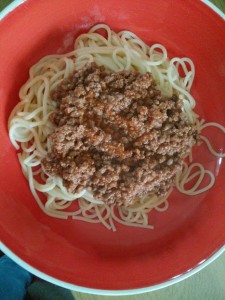
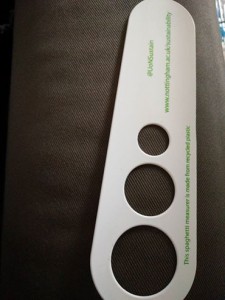
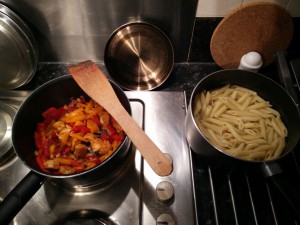
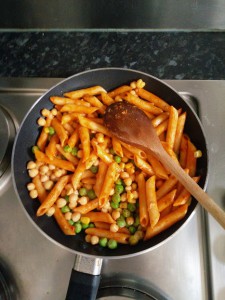
Leave a Reply